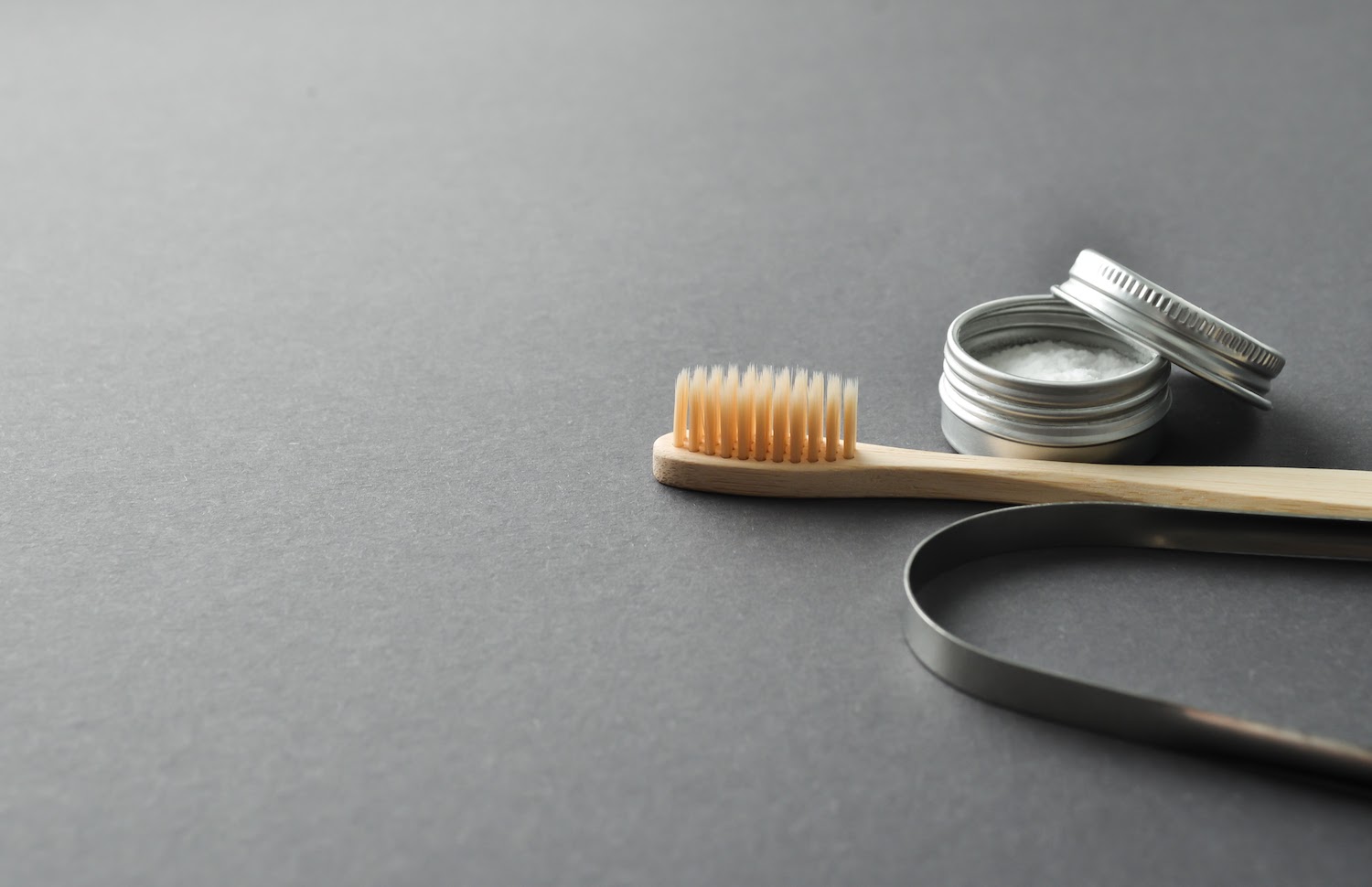
According to Ayurveda, the mouth is THE major gateway to the human body. Taking good care of it is vital to physical, mental, and emotional wellness (if you’ve ever had bad breath you know what I’m talking about). In fact, Ayurvedic practitioners examine the tongue, teeth, and lips to get a picture of overall health because the mouth provides clues to the state of the entire body!
For most of us, dental care is something we’ve been doing since before we could walk or talk, yet it’s not one of the first things we think of when considering how to improve our overall health and well-being. Ayurveda holds that mouth care is as important and vital to our health as any other wellness practices, and recommends a comprehensive daily routine for oral care that focuses on whole-body health (brushing your teeth isn’t the half of it). With smart mouth practices, you can achieve holistic well-being from the inside out.

Scraping the tongue is a vital part of the Ayurvedic daily routine. It stimulates the internal organs, removes bacteria, aids digestion, and is also a great way to keep your breath fresh! By cleaning surface tissue, taste buds are able to detect and process the six different tastes (sour, sweet, bitter, pungent, salty), making these substances available to the rest of the body.
Tongue scraping is considered good for all the organs, and Ayurvedic medicine asserts that the practice clears the mind and reduces ama (toxins, dead bacteria). In addition, the tongue is associated with the thyroid, lungs, heart, kidneys, stomach, and colon. By scraping the tongue, you not only maintain a healthy mouth but on a subtle level, you also maintain healthy viscera.
So, how do you do it? Using a copper tongue scraper, gently scrape the entire tongue from the back forward for 7 to 14 strokes every morning, and observe the benefits for yourself.
Newer to the Western world, oil pulling has been touted in Ayurveda as a practice that cures over 30 systemic illnesses, including headaches, hypertension, diabetes, and asthma. Oil pulling also helps prevent bad breath, decay, bleeding gums, dry mouth/throat, loss of taste, cracked lips, strengthens teeth, gums and the jaw, and purifies the entire system. Oil pulling results in reductions in plaque-induced gum disease and bacterial colony counts in the mouth. According to the NIH:
“Oil pulling is a powerful detoxifying Ayurvedic technique that has recently become very popular as a complementary and alternative remedy for many health ailments. Using this method, surgery or medication could be prevented for a number of chronic illnesses. The oil therapy is preventative as well as curative.
The exciting aspect of this healing method is its simplicity. Ayurveda advises oil gargling to purify the entire system, as it holds that each section of the tongue is connected to a different organ such as the kidneys, lungs, liver, heart, small intestines, stomach, colon, and spine, similarly to reflexology and Traditional Chinese Medicine.”
Work with about a tablespoon of your seasonal Oral Swish and swish it around in the mouth for up to 20 minutes (just until the oil is milky and your mouth stops feeling oily) before spitting it out. Oh, and be mindful of your plumbing and make sure to dispose of the oil in the trash.
According to Ayurveda, sweet toothpastes cause a thickening of the saliva and an increase in its calcium content, which can lead to tartar formation. And too much fluoride or baking soda can erode the gums. Commercial kinds of toothpastes are often full of chemicals, colors, and artificial sweeteners. You can avoid all of that by making your own tooth powder or buying a natural toothpaste with some of these properties.
Ayurveda recommends cleaning the teeth with a soft brush and tooth cleaner (paste or powder) that is astringent (for tightening the gums), pungent (for its cleansing qualities), and bitter (for its antiseptic qualities). The best toothpaste is bitter and astringent, made with herbs such as neem, Triphala, cinnamon, clove, fennel, babool, and pilu. You can find herbal kinds of toothpaste online and at natural health food stores.
Problems with your teeth are often related to a deficiency of calcium, magnesium, and zinc. To compensate and to prevent future problems chew a handful of mineral-rich white sesame seeds (roasted or toasted) every morning before breakfast. Then brush your teeth with plain water so the residue of the sesame seeds can rub against your teeth, polishing and cleaning them.
Licorice cleanses the mouth, promotes salivation, and increases secretions in the gastrointestinal tract. Chewing on licorice root will clean the mouth and cleanse the teeth, halting tooth decay.
The general hygiene of the mouth extends from just brushing your teeth, flossing and using a mouthwash. These daily Ayurveda practices are held in place to not only maintain the health of the oral cavity but the health of the entire body, as each body part is connected and impacted by one another.
If you want more personalized help, sign up for a free complimentary consultation below so we can discuss your individual needs.
Kerry is a Ted Talk presenter and author of the book the 25-Day Ayurveda Cleanse.

The Holistic HIghway integrates traditional Western medical practices with Ayurveda medicine, creating a focus on prevention through nutrition, diet, and exercise; use of the latest genetic testing and other diagnostic techniques; and prescribed combinations of botanical medicines, supplements, therapeutic diets, detoxification programs, or stress-management techniques.

Integrative Health Expert | Ayurveda Practitioner | Author | Speaker
Kerry is a globally recognized leader in integrative medicine and the science of health known as Ayurveda. She is passionate about raising awareness of the need for a change in contemporary medicine that focuses on patient empowerment and a health-based (rather than disease-based) medical system.
Kerry is connected with The University of Pittsburgh Center for Integrative Medicine and remains a pioneer in the field of integrative medicine where she has developed a personalized system to manage chronic disorders by incorporating fundamental changes in diet, behavior, and stress while focusing on genetics.
This individualized program is so successful that many of her clients have achieved maximum healing and vitality after years of chronic problems!
More to Explore